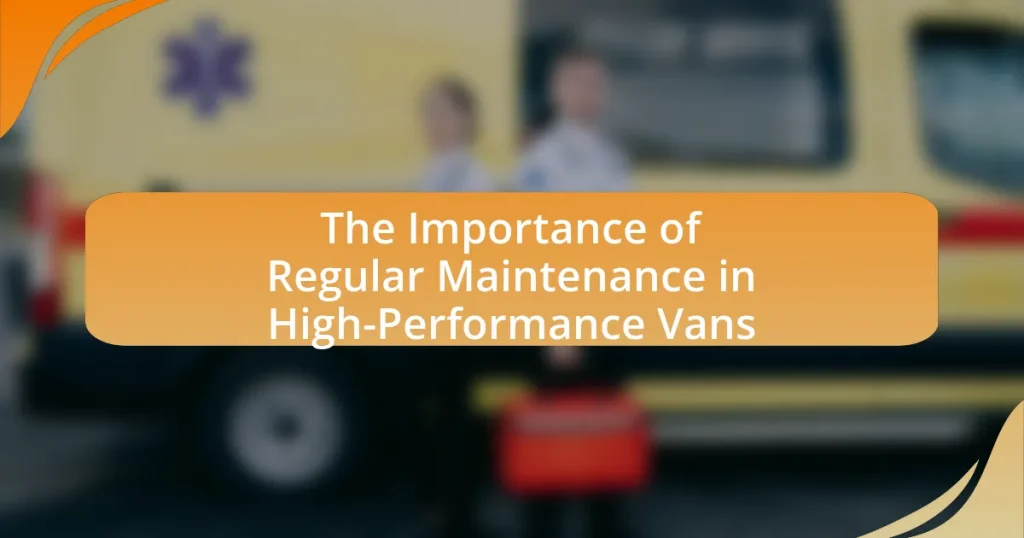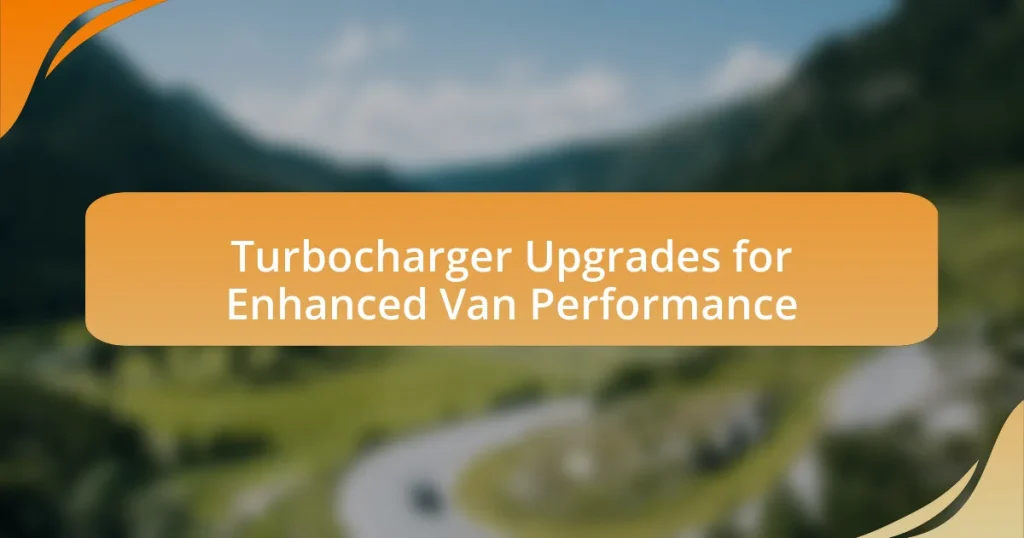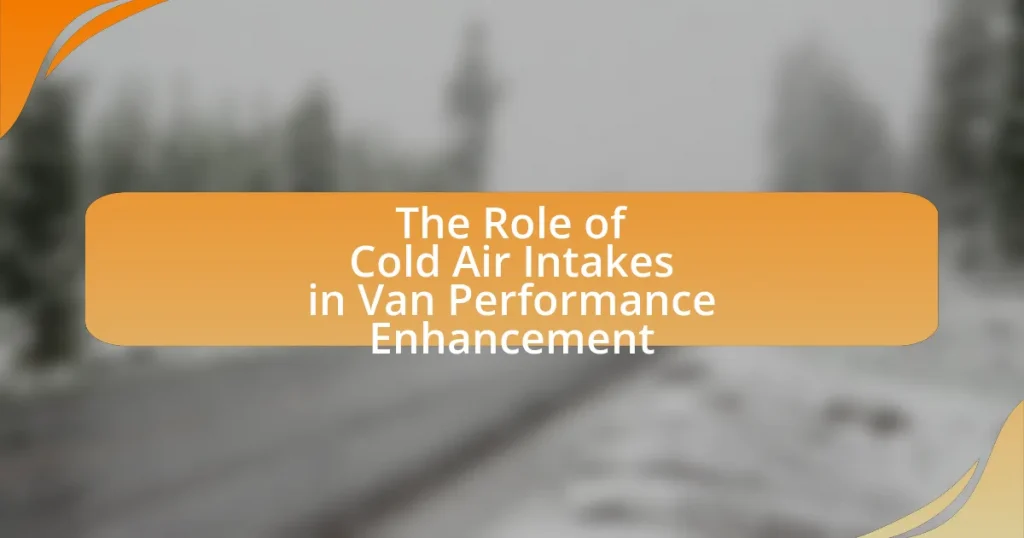The article focuses on the importance of regular maintenance in high-performance vans, emphasizing its role in ensuring optimal performance, safety, and longevity. It outlines the specific components that require routine checks, such as the engine, brakes, tires, and suspension systems, and discusses the consequences of neglecting maintenance, including decreased reliability and increased repair costs. The article also highlights best practices for maintenance, the financial impacts of inadequate upkeep, and the benefits of regular inspections in enhancing vehicle performance and efficiency. Overall, it underscores the necessity of consistent maintenance to prevent mechanical failures and extend the lifespan of high-performance vans.
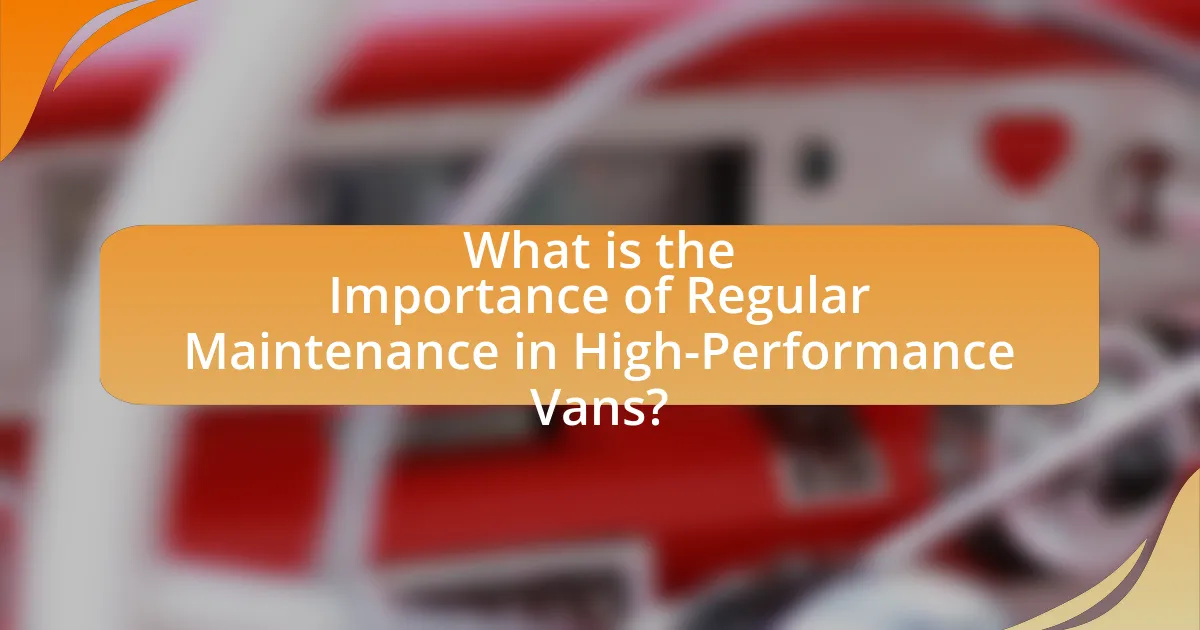
What is the Importance of Regular Maintenance in High-Performance Vans?
Regular maintenance in high-performance vans is crucial for ensuring optimal performance, safety, and longevity of the vehicle. High-performance vans are engineered for enhanced speed, handling, and load capacity, which places additional stress on their components. Routine checks and servicing, including oil changes, brake inspections, and tire rotations, help prevent mechanical failures and maintain peak operational efficiency. According to the Automotive Maintenance and Repair Association, regular maintenance can extend a vehicle’s lifespan by up to 50%, significantly reducing the risk of costly repairs and downtime.
Why is regular maintenance crucial for high-performance vans?
Regular maintenance is crucial for high-performance vans because it ensures optimal functionality and longevity of the vehicle. High-performance vans operate under more demanding conditions than standard vehicles, which can lead to increased wear and tear on critical components. For instance, regular checks on the engine, brakes, and suspension systems help identify potential issues before they escalate into costly repairs or safety hazards. According to a study by the Automotive Maintenance and Repair Association, vehicles that receive consistent maintenance can experience up to 30% fewer breakdowns, highlighting the importance of routine care in maintaining performance and reliability.
What specific components require regular maintenance in high-performance vans?
High-performance vans require regular maintenance of several specific components, including the engine, transmission, brakes, tires, and suspension system. The engine needs routine oil changes and filter replacements to ensure optimal performance and longevity. The transmission requires fluid checks and changes to maintain smooth shifting and prevent wear. Brake systems, including pads and rotors, must be inspected and replaced as necessary to ensure safety and effective stopping power. Tires should be regularly rotated and checked for tread wear and pressure to enhance handling and fuel efficiency. Lastly, the suspension system, including shocks and struts, needs periodic inspection to maintain ride quality and vehicle stability. Regular maintenance of these components is essential for the reliability and performance of high-performance vans.
How does neglecting maintenance affect the performance of high-performance vans?
Neglecting maintenance significantly reduces the performance of high-performance vans. When regular maintenance tasks, such as oil changes, tire rotations, and brake inspections, are overlooked, the engine efficiency declines, leading to decreased power output and fuel economy. For instance, a study by the American Automobile Association found that poorly maintained vehicles can lose up to 25% of their fuel efficiency. Additionally, neglecting maintenance can result in premature wear of critical components, such as the transmission and suspension systems, which can lead to costly repairs and compromised safety. Therefore, consistent maintenance is essential to ensure optimal performance and longevity of high-performance vans.
What are the consequences of inadequate maintenance?
Inadequate maintenance of high-performance vans leads to decreased reliability and increased risk of mechanical failure. This lack of upkeep can result in engine problems, brake failure, and tire blowouts, which compromise safety and performance. According to a study by the National Highway Traffic Safety Administration, vehicles that are not regularly maintained are 50% more likely to experience a breakdown. Additionally, inadequate maintenance can lead to higher repair costs over time, as minor issues can escalate into major problems if not addressed promptly.
How can poor maintenance lead to safety issues in high-performance vans?
Poor maintenance can lead to safety issues in high-performance vans by causing critical components to fail, which compromises vehicle stability and control. For instance, neglecting regular checks on brakes, tires, and suspension systems can result in decreased braking efficiency, tire blowouts, or loss of traction, all of which significantly increase the risk of accidents. According to the National Highway Traffic Safety Administration, approximately 22% of vehicle crashes are attributed to maintenance-related issues, highlighting the direct correlation between inadequate upkeep and safety hazards.
What financial impacts can arise from neglecting regular maintenance?
Neglecting regular maintenance can lead to significant financial impacts, including increased repair costs, reduced vehicle lifespan, and decreased resale value. For instance, failure to perform routine oil changes can result in engine damage, which may cost thousands of dollars to repair. According to a study by the American Automobile Association, regular maintenance can save vehicle owners up to 30% on repair costs over time. Additionally, high-performance vans that are not maintained properly may experience performance issues, leading to higher fuel consumption and operational costs. This cumulative effect of neglecting maintenance ultimately results in a financial burden that exceeds the cost of regular upkeep.
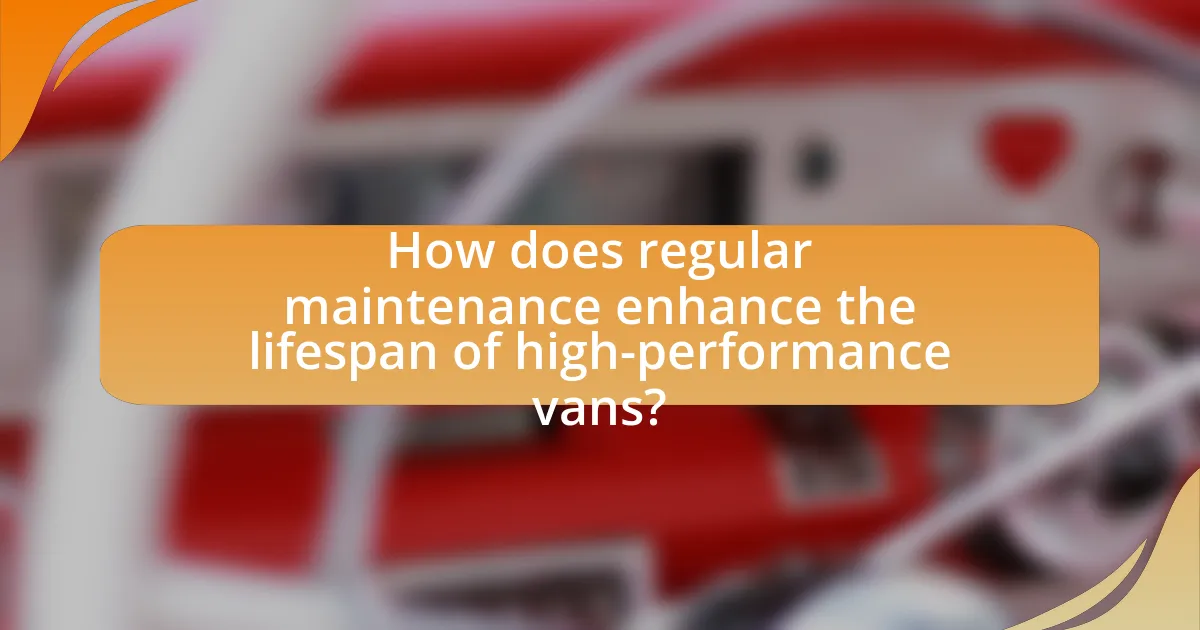
How does regular maintenance enhance the lifespan of high-performance vans?
Regular maintenance significantly enhances the lifespan of high-performance vans by ensuring optimal functioning of critical components. Routine checks and servicing, such as oil changes, brake inspections, and tire rotations, prevent wear and tear that can lead to costly repairs or breakdowns. For instance, according to a study by the Automotive Maintenance and Repair Association, vehicles that receive regular maintenance can last up to 50% longer than those that do not. This proactive approach not only extends the operational life of high-performance vans but also maintains their performance standards, ensuring safety and reliability on the road.
What maintenance practices are essential for prolonging the lifespan of high-performance vans?
Regular maintenance practices essential for prolonging the lifespan of high-performance vans include routine oil changes, tire rotations, brake inspections, and regular engine diagnostics. These practices ensure optimal performance and prevent premature wear and tear. For instance, changing the oil every 5,000 to 7,500 miles helps maintain engine lubrication and efficiency, while rotating tires every 6,000 to 8,000 miles promotes even tread wear, enhancing safety and performance. Additionally, inspecting brakes regularly can prevent costly repairs and ensure safe stopping power, which is critical for high-performance vehicles. Regular engine diagnostics can identify potential issues before they escalate, contributing to the overall longevity of the van.
How often should high-performance vans undergo maintenance checks?
High-performance vans should undergo maintenance checks every 5,000 to 10,000 miles, or at least twice a year, depending on usage and manufacturer recommendations. Regular maintenance is crucial for ensuring optimal performance, safety, and longevity of the vehicle. According to the American Automobile Association (AAA), neglecting maintenance can lead to decreased efficiency and increased repair costs, emphasizing the importance of adhering to a consistent maintenance schedule.
What role does routine inspection play in maintaining high-performance vans?
Routine inspection is crucial for maintaining high-performance vans as it ensures optimal functionality and safety. Regular checks identify potential issues such as wear and tear, fluid levels, and brake performance, which can significantly affect the vehicle’s performance. According to the National Highway Traffic Safety Administration, routine maintenance can prevent up to 75% of vehicle breakdowns, highlighting the importance of inspections in avoiding costly repairs and enhancing vehicle longevity.
How does regular maintenance improve performance and efficiency?
Regular maintenance enhances performance and efficiency by ensuring that all components of high-performance vans operate optimally. Routine checks and servicing, such as oil changes, tire rotations, and brake inspections, prevent wear and tear, which can lead to decreased functionality. For instance, a study by the American Automobile Association (AAA) found that properly maintained vehicles can achieve up to 15% better fuel efficiency compared to those that are neglected. This improvement is attributed to factors like clean air filters and properly inflated tires, which reduce engine strain and enhance overall vehicle responsiveness.
What specific performance metrics are affected by regular maintenance?
Regular maintenance significantly affects performance metrics such as fuel efficiency, engine power output, and overall vehicle reliability. For instance, routine oil changes and air filter replacements can enhance fuel efficiency by up to 10%, as clean oil reduces friction and allows the engine to operate more smoothly. Additionally, maintaining tire pressure and alignment can improve handling and traction, directly impacting engine power output and acceleration. Furthermore, consistent maintenance checks can prevent breakdowns, thereby increasing overall vehicle reliability and reducing downtime, which is crucial for high-performance vans that rely on optimal functioning for both safety and performance.
How can regular maintenance lead to better fuel efficiency in high-performance vans?
Regular maintenance can lead to better fuel efficiency in high-performance vans by ensuring that all engine components are functioning optimally. When high-performance vans undergo routine checks, such as oil changes, air filter replacements, and tire rotations, they operate more efficiently, reducing fuel consumption. For instance, a clean air filter can improve airflow to the engine, enhancing combustion efficiency and potentially increasing fuel economy by up to 10%. Additionally, properly inflated tires reduce rolling resistance, which can further improve fuel efficiency. Regular maintenance not only keeps the engine running smoothly but also prevents issues that could lead to decreased performance and higher fuel usage.

What are the best practices for maintaining high-performance vans?
The best practices for maintaining high-performance vans include regular inspections, timely oil changes, and proper tire maintenance. Regular inspections help identify potential issues before they escalate, ensuring optimal performance and safety. Timely oil changes, typically every 5,000 to 7,500 miles, keep the engine lubricated and functioning efficiently, which is crucial for high-performance vehicles. Proper tire maintenance, including checking tire pressure and tread depth, enhances handling and fuel efficiency, which are vital for high-performance driving. Following these practices can significantly extend the lifespan and reliability of high-performance vans.
What routine checks should be included in a maintenance schedule for high-performance vans?
Routine checks that should be included in a maintenance schedule for high-performance vans encompass engine oil levels, tire pressure and tread depth, brake system functionality, fluid levels (coolant, transmission, and brake fluids), battery condition, and suspension system integrity. These checks are essential to ensure optimal performance and safety, as high-performance vans operate under more demanding conditions than standard vehicles. For instance, maintaining proper tire pressure can enhance fuel efficiency and handling, while regular brake inspections are crucial for preventing accidents due to brake failure. Additionally, monitoring fluid levels helps prevent engine overheating and mechanical failures, which are critical for high-performance vehicles that rely on precision engineering.
How can owners effectively track maintenance schedules for their high-performance vans?
Owners can effectively track maintenance schedules for their high-performance vans by utilizing digital maintenance management systems or mobile applications designed for vehicle upkeep. These tools allow owners to set reminders for service intervals based on mileage or time, log completed maintenance tasks, and access service history. Research indicates that regular tracking can enhance vehicle performance and longevity, as high-performance vans often require more frequent maintenance due to their advanced engineering and higher operational demands. For instance, a study by the Automotive Maintenance and Repair Association found that vehicles with scheduled maintenance tracking experience a 30% reduction in unexpected repairs, underscoring the importance of systematic tracking for optimal performance.
What tools and resources are recommended for DIY maintenance of high-performance vans?
For DIY maintenance of high-performance vans, essential tools include a comprehensive toolset, torque wrenches, diagnostic scanners, and fluid change kits. A comprehensive toolset allows for various repairs and adjustments, while torque wrenches ensure proper tightening of components, which is critical for performance vehicles. Diagnostic scanners help identify issues by reading error codes from the vehicle’s computer, enabling timely repairs. Fluid change kits are necessary for maintaining engine oil, transmission fluid, and coolant, which are vital for optimal performance. These tools are widely recommended by automotive experts and are crucial for maintaining the efficiency and longevity of high-performance vans.
What common troubleshooting tips can help maintain high-performance vans?
Regular maintenance is essential for maintaining high-performance vans, and common troubleshooting tips include checking tire pressure, inspecting fluid levels, and monitoring engine performance. Proper tire pressure ensures optimal traction and fuel efficiency, while regular fluid checks, including oil, coolant, and brake fluid, prevent overheating and mechanical failures. Additionally, monitoring engine performance through diagnostic tools can identify issues early, allowing for timely repairs. These practices are supported by automotive maintenance guidelines, which emphasize that neglecting these areas can lead to decreased performance and increased repair costs.
How can drivers identify early signs of maintenance issues in high-performance vans?
Drivers can identify early signs of maintenance issues in high-performance vans by monitoring unusual noises, changes in handling, warning lights on the dashboard, and fluid leaks. Unusual noises, such as grinding or squeaking, often indicate problems with brakes or suspension components. Changes in handling, like pulling to one side or vibrations, can signal alignment or tire issues. Dashboard warning lights, particularly those related to the engine or brakes, serve as critical alerts for potential malfunctions. Additionally, visible fluid leaks under the vehicle can point to issues with the engine, transmission, or brakes. Regularly checking these indicators can help prevent more severe problems and ensure optimal performance.
What are the best practices for addressing minor issues before they escalate?
The best practices for addressing minor issues before they escalate include conducting regular inspections, maintaining open communication, and implementing timely repairs. Regular inspections help identify potential problems early, allowing for proactive measures to be taken. Open communication among team members ensures that minor concerns are reported and addressed promptly. Timely repairs prevent small issues from developing into larger, more costly problems, thereby maintaining the performance and reliability of high-performance vans. According to the Automotive Maintenance and Repair Association, regular maintenance can reduce the likelihood of major repairs by up to 50%, highlighting the effectiveness of these practices.
